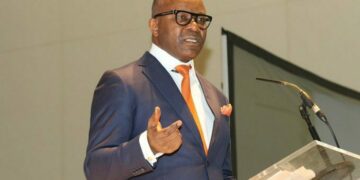Despite a decline in capital inflows into the country in the first quarter of 2023 compared to the figure recorded in the first quarter of 2022, analysts say, they expect the recent reforms in the foreign exchange sector to push foreign currency inflows into Nigeria up to $6.2 billion by the end of this year. In 2022, the country recorded a total capital inflow of $5.32 billion.
The National Bureau of Statistics(NBS) recently reported that total capital inflows for the first three months of 2023 declined significantly by 28 per cent year on year to $1.13 billion. The inflow in the first quarter of the year was however a 6.78 per cent improvement over $1.06 billion that was reported in the last three months of 2022.
Although, the value of inflow depreciated compared to 2022 Q1, analysts have said they expect an improvement in capital inflows based on increased optimism by investors following efforts of the present government as well as the Central Bank of Nigeria (CBN) to boost foreign the exchange market.
The CBN, in tandem with the federal government, has introduced several policies to improve Nigeria’s ability to attract foreign capital and diaspora remittances. In the latest move to ease the challenges of investors in the forex market, the CBN announced that the 62 approved international money transfer operators could explore naira as a payout option, including dollars and e -Naira.
Also, these operators must use the Investors’ and Exporters’ (I&E) rate to process the payments to the beneficiaries. This, alongside the collapse of the different foreign exchange windows into one window and pivoting the forex administration into a managed float, has been lauded by traders, analysts and investors alike who see the moves as pro-market in nature.
Analysts at Meristem Research, in an emailed note said: ‘expect an improvement in the capital inflows owing to increased investors’ optimism in the reforms of the new administration.’
Similarly, analysts at Afrinvest West Africa said: “we believe these recent measures can help reverse the ugly trends of low foreign capital and remittance into the country.
“Additionally, poor business climate stemming from weak infrastructure, policy mismatch, insecurity, and increasing poverty are some of the challenges that undermine the attractiveness of capital inflows, especially FDIs and remittances.
“Therefore, the introduction of policies to support business growth, increase crude oil production and diversify forex earnings would allow the CBN to reduce its reliance on capital controls to manage forex reserves and, in turn, the free flow of capital would reduce the apathy of foreign investors to Nigeria.
“In light of recent initiatives by the new government, we maintain our base case capital importation projection of $6.2 billion for FY:2023. This is hinged on unification of forex rates and pivot to a managed float system that keep rates close to its fundamental value and less aggressive capital controls in H2:2023.”
Commenting on the Q1 2023 capital inflow figures, analysts at Cordros Capital said: “the year-on-year deterioration in the period reflects foreign investors’ lacklustre interest in the country given an unclear foreign exchange framework, an uninspiring macro narrative, elevated global interest rates, and heightened global uncertainties.
“While we think the recent policy pronouncements are positive and may boost foreign investor’s confidence over the medium term, we believe they will adopt a wait-and-see approach, for now, looking for signals on the CBN’s plans to start clearing the forex backlogs and boost forex supply to support the market in the near term. Thus, if local forex liquidity improves, market rates increase, and investors can easily repatriate capital, we expect foreign capital inflows to increase over the short-to-medium term.”
For analysts at Cowry Assets Management, the year on year decline in capital importation from Q1 2022 suggests that there are still challenges that need to be addressed in order to attract more foreign investment into the country.
“This is majorly the call on the federal government to speedily address the perennial issues or challenges that have continued to clog the pipeline of investment into the country. These challenges include the high cost of doing business in Nigeria, the unstable political and security environment, and the lack of transparency in government regulations.
“However, the increase in capital importation in Q1 2023 from the previous quarter is a positive sign for the Nigerian economy. We think that despite the highlighted challenges in the economy, Nigeria remains a promising destination for foreign investment as it has a large and growing population, a young and educated workforce, and a wealth of natural resources.
With the right policies and reforms in place, Nigeria can attract the investment it needs to achieve its economic potential,” they pointed out.





